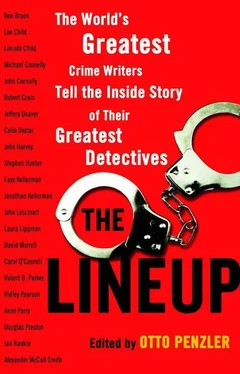Otto Penzler - The Lineup - The World's Greatest Crime Writers Tell the Inside Story of Their Greatest Detectives
Здесь есть возможность читать онлайн «Otto Penzler - The Lineup - The World's Greatest Crime Writers Tell the Inside Story of Their Greatest Detectives» весь текст электронной книги совершенно бесплатно (целиком полную версию без сокращений). В некоторых случаях можно слушать аудио, скачать через торрент в формате fb2 и присутствует краткое содержание. Жанр: Прочая документальная литература, на английском языке. Описание произведения, (предисловие) а так же отзывы посетителей доступны на портале библиотеки ЛибКат.
- Название:The Lineup: The World's Greatest Crime Writers Tell the Inside Story of Their Greatest Detectives
- Автор:
- Жанр:
- Год:неизвестен
- ISBN:нет данных
- Рейтинг книги:4 / 5. Голосов: 1
-
Избранное:Добавить в избранное
- Отзывы:
-
Ваша оценка:
- 80
- 1
- 2
- 3
- 4
- 5
The Lineup: The World's Greatest Crime Writers Tell the Inside Story of Their Greatest Detectives: краткое содержание, описание и аннотация
Предлагаем к чтению аннотацию, описание, краткое содержание или предисловие (зависит от того, что написал сам автор книги «The Lineup: The World's Greatest Crime Writers Tell the Inside Story of Their Greatest Detectives»). Если вы не нашли необходимую информацию о книге — напишите в комментариях, мы постараемся отыскать её.
The most venerated and bestselling authors in the mystery world reveal how they created their most beloved serial characters.
The Lineup: The World's Greatest Crime Writers Tell the Inside Story of Their Greatest Detectives — читать онлайн бесплатно полную книгу (весь текст) целиком
Ниже представлен текст книги, разбитый по страницам. Система сохранения места последней прочитанной страницы, позволяет с удобством читать онлайн бесплатно книгу «The Lineup: The World's Greatest Crime Writers Tell the Inside Story of Their Greatest Detectives», без необходимости каждый раз заново искать на чём Вы остановились. Поставьте закладку, и сможете в любой момент перейти на страницу, на которой закончили чтение.
Интервал:
Закладка:
IV
So where did Rebus come from? Well, from my subconscious, obviously, from a young man’s brain, filled with stories and strategies. But also from the books I’d been reading, the city I’d made my home, and the blood that had soaked into its pavements and roadways. Yet it still seems to me that he appeared as a bolt from the blue. I’ve looked at photos of myself in my student room in Arden Street, and have pored over my diaries from the time, seeking clues. The notes I jotted down prior to starting the novel shed very little light. I saw the book as “a metaphysical thriller” but spent very little time delineating Rebus’s character. I wanted the story to contain lots of “puzzles and wordplay,” wanted it to be “a very visual piece,” and decided it should be written in the third person: “Don’t need to go too far inside the main character’s head.” Rebus was to be a cipher rather than a three-dimensional human being. From a rereading of Knots and Crosses, I think it’s true to say that the reader feels more distanced from Rebus in that book than in any of the others that followed. There was a good reason for this: I wanted Rebus himself to exist as a potential suspect in people’s minds. Hence the momentary flashbacks, the hints of something awful in his past, and the “locked room” in his apartment. He also at one point almost strangles a woman who has invited him into her bed.
Nice.
Through sheer force of will, however, Rebus stuck around and grew into someone more fully formed, to the point where fans are now worried about his health and find when they meet me that I fall disappointingly short of Rebus himself. I’m just not as damaged as he is, as complex, or as dangerous to be around. I’m only the bloke who commits his stories to paper. What became obvious to me early on was that a detective makes for a terrific commentator on the world around him. He has access to the highest in the land and the lowest, the politicians and oligarchs, as well as the junkies and petty thieves. In writing books about Edinburgh, I could examine the city (and the nation of which it is capital once more) from top to bottom through Rebus’s eyes. I was lucky too-there was no tradition of the crime novel in Scotland, so I could make my own path. And back then there were no crime novels set in contemporary Edinburgh, meaning that for a little while I had no competition.
I’ve been lucky also in that Edinburgh and Scotland continue to change in interesting ways, giving me plenty of plots while delivering up their secrets and mysteries only very slowly. I’ve been living in this city now for almost thirty years, on and off, and it continues to surprise me. Underground streets and chambers are still being discovered. Archaeological digs at the castle bring new truths to the surface. Exhibits long forgotten in the various museums turn out to have their own tales worth telling. As a subject, the city seems inexhaustible. This is, after all, a city of words. Where else in the world would you find the main railway station named after a novel (Waverley) and a vast edifice in the city center celebrating that work’s author (the Scott Monument)? Robert Louis Stevenson brought his own imagination to bear on his hometown. Arthur Conan Doyle was born here. Muriel Spark grew up here. Robert Burns made his name here. James M. Barrie was a student here. Not to mention the likes of Carlyle and Hume. Right up to J. K. Rowling, Irvine Welsh, and Alexander McCall Smith in the present day.
Rebus, too, is composed of words-millions of them-so you might think that by now I’d have got to the heart of what makes him tick, but he continues to surprise me, which is perhaps only fitting for a man whose name means “puzzle.” For twenty years now, he’s been living inside my head, but sometimes it feels as though I’m the one living in his. When a psychoanalyst interviewed me at a book festival a while back, he wondered if Rebus represented the brother I never had, or maybe the life of adventure I was never going to allow myself to lead. Both my parents served in World War II (my father in the Far East). One of my two sisters married a Royal Air Force engineer and spent much of her life thereafter traveling the world. As a kid, I once wrote to the army asking for information on joining up. But I was resolutely bookish, and all my adventures took place inside my head.
Maybe the psychoanalyst had a point; maybe Rebus really is an extension of my own personality-doing all the dangerous stuff I’d be too scared to do, breaking rules and conventions, getting into fights and scrapes, and even coming up against the occasional deadly force. Some commentators have decided that Dr. Jekyll and Mr. Hyde is a book about the creative process and the division between our rational mind and the darker fantasies we keep hidden from view. In which case, Rebus would be my Hyde, acting as a force of nature, saying the unsayable, doing things I could never bring myself to do-even though I could (and can) all too readily imagine myself doing them.
Sir Winston Churchill once called Russia “a riddle wrapped in a mystery inside an enigma.” I’ve found the same to be true of Scotland and Edinburgh.
And of Detective Inspector John Rebus.
ALEXANDER McCALL SMITH
Alexander McCall Smith is a Scotsman born in Bulawayo, Rhodesia (now Zimbabwe), in 1948; he studied law at the University of Edinburgh, where he is now emeritus professor of law. A highly respected expert on medical law and bioethics, he is the former chairman of the British Medical Journal Ethics Committee, the former vice chairman of the Human Genetics Commission to the United Kingdom, and a former member of the International Bioethics Commission of UNESCO. When his writing career became a full-time commitment, he discontinued his involvement in these areas.
His series about Precious Ramotswe of the No. 1 Ladies’ Detective Agency, which began as a series of short stories for a small Scottish publisher in 1998, have become enormous international bestsellers (and the basis for a popular television series), as have his other books, notably the six volumes about Isabel Dalhousie of the Sunday Philosophy Club (The Sunday Philosophy Club, 2004; Friends, Lovers, Chocolate, 2005; The Right Attitude to Rain, 2006; The Careful Use of Compliments, 2007; The Comforts of a Muddy Saturday, 2008; and The Lost Art of Gratitude, 2009). He has also written three novels in the Portuguese Irregular Verbs series, five in the 44 Scotland Street series, and three short-story collections, all of which are told with a gentle charm that cannot help but captivate readers. He has also written nineteen children’s books. Professor McCall Smith lives in Edinburgh with his wife, a doctor; they have two daughters.
PRECIOUS RAMOTSWE
BY ALEXANDER McCALL SMITH
1
My entire childhood and youth were spent in Africa, in a bewitchingly beautiful but somewhat unhappy country then called Southern Rhodesia. The rest of my life, the greater part of it, has been spent in Scotland. I consider myself a Scot who has had one foot in Africa, which is a continent I love. Most people who have lived for any time in Africa are affected by it profoundly. It is a part of the world with which it appears to be very easy to fall in love. It claims the heart, and often breaks it-again and again.
That is why I write about it.
2
In 1980, I went to work for six months in Swaziland, a small country sandwiched between Mozambique and South Africa. I worked at the university there, and I lived in a house that had magnificent views of the mountains about which Rider Haggard wrote in King Solomon’s Mines. I had not been in Africa for a long time and I found many memories came flooding back. I was there in the rainy season, and once again I experienced that extraordinary sensation-the smell of rain on the wind. I saw birds that I remembered seeing as a child. Outside my window was a great bougainvillea bush of the sort that grew outside my window when I was a boy.
Читать дальшеИнтервал:
Закладка:
Похожие книги на «The Lineup: The World's Greatest Crime Writers Tell the Inside Story of Their Greatest Detectives»
Представляем Вашему вниманию похожие книги на «The Lineup: The World's Greatest Crime Writers Tell the Inside Story of Their Greatest Detectives» списком для выбора. Мы отобрали схожую по названию и смыслу литературу в надежде предоставить читателям больше вариантов отыскать новые, интересные, ещё непрочитанные произведения.
Обсуждение, отзывы о книге «The Lineup: The World's Greatest Crime Writers Tell the Inside Story of Their Greatest Detectives» и просто собственные мнения читателей. Оставьте ваши комментарии, напишите, что Вы думаете о произведении, его смысле или главных героях. Укажите что конкретно понравилось, а что нет, и почему Вы так считаете.












